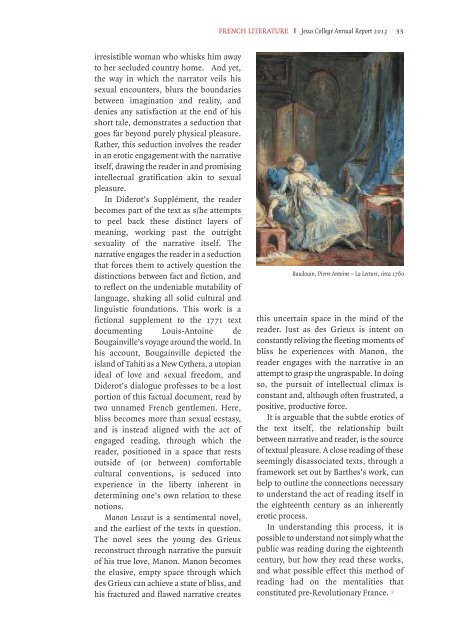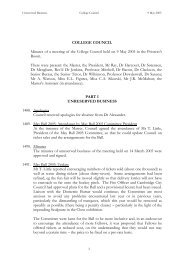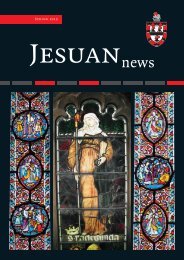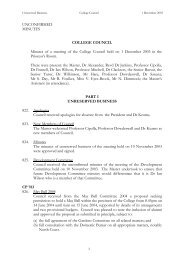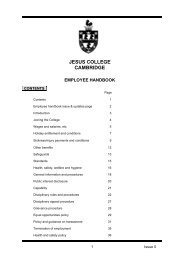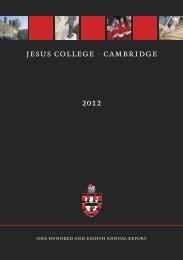2013 Annual Report - Jesus College - University of Cambridge
2013 Annual Report - Jesus College - University of Cambridge
2013 Annual Report - Jesus College - University of Cambridge
You also want an ePaper? Increase the reach of your titles
YUMPU automatically turns print PDFs into web optimized ePapers that Google loves.
FRENCH LITERATURE I <strong>Jesus</strong> <strong>College</strong> <strong>Annual</strong> <strong>Report</strong> <strong>2013</strong> 33<br />
irresistible woman who whisks him away<br />
to her secluded country home. And yet,<br />
the way in which the narrator veils his<br />
sexual encounters, blurs the boundaries<br />
between imagination and reality, and<br />
denies any satisfaction at the end <strong>of</strong> his<br />
short tale, demonstrates a seduction that<br />
goes far beyond purely physical pleasure.<br />
Rather, this seduction involves the reader<br />
in an erotic engagement with the narrative<br />
itself, drawing the reader in and promising<br />
intellectual gratification akin to sexual<br />
pleasure.<br />
In Diderot’s Supplément, the reader<br />
becomes part <strong>of</strong> the text as s/he attempts<br />
to peel back these distinct layers <strong>of</strong><br />
meaning, working past the outright<br />
sexuality <strong>of</strong> the narrative itself. The<br />
narrative engages the reader in a seduction<br />
that forces them to actively question the<br />
distinctions between fact and fiction, and<br />
to reflect on the undeniable mutability <strong>of</strong><br />
language, shaking all solid cultural and<br />
linguistic foundations. This work is a<br />
fictional supplement to the 1771 text<br />
documenting Louis-Antoine de<br />
Bougainville’s voyage around the world. In<br />
his account, Bougainville depicted the<br />
island <strong>of</strong> Tahiti as a New Cythera, a utopian<br />
ideal <strong>of</strong> love and sexual freedom, and<br />
Diderot’s dialogue pr<strong>of</strong>esses to be a lost<br />
portion <strong>of</strong> this factual document, read by<br />
two unnamed French gentlemen. Here,<br />
bliss becomes more than sexual ecstasy,<br />
and is instead aligned with the act <strong>of</strong><br />
engaged reading, through which the<br />
reader, positioned in a space that rests<br />
outside <strong>of</strong> (or between) comfortable<br />
cultural conventions, is seduced into<br />
experience in the liberty inherent in<br />
determining one’s own relation to these<br />
notions.<br />
Manon Lescaut is a sentimental novel,<br />
and the earliest <strong>of</strong> the texts in question.<br />
The novel sees the young des Grieux<br />
reconstruct through narrative the pursuit<br />
<strong>of</strong> his true love, Manon. Manon becomes<br />
the elusive, empty space through which<br />
des Grieux can achieve a state <strong>of</strong> bliss, and<br />
his fractured and flawed narrative creates<br />
Baudouin, Pierre Antoine – La Lecture, circa 1760<br />
this uncertain space in the mind <strong>of</strong> the<br />
reader. Just as des Grieux is intent on<br />
constantly reliving the fleeting moments <strong>of</strong><br />
bliss he experiences with Manon, the<br />
reader engages with the narrative in an<br />
attempt to grasp the ungraspable. In doing<br />
so, the pursuit <strong>of</strong> intellectual climax is<br />
constant and, although <strong>of</strong>ten frustrated, a<br />
positive, productive force.<br />
It is arguable that the subtle erotics <strong>of</strong><br />
the text itself, the relationship built<br />
between narrative and reader, is the source<br />
<strong>of</strong> textual pleasure. A close reading <strong>of</strong> these<br />
seemingly disassociated texts, through a<br />
framework set out by Barthes’s work, can<br />
help to outline the connections necessary<br />
to understand the act <strong>of</strong> reading itself in<br />
the eighteenth century as an inherently<br />
erotic process.<br />
In understanding this process, it is<br />
possible to understand not simply what the<br />
public was reading during the eighteenth<br />
century, but how they read these works,<br />
and what possible effect this method <strong>of</strong><br />
reading had on the mentalities that<br />
constituted pre-Revolutionary France.


